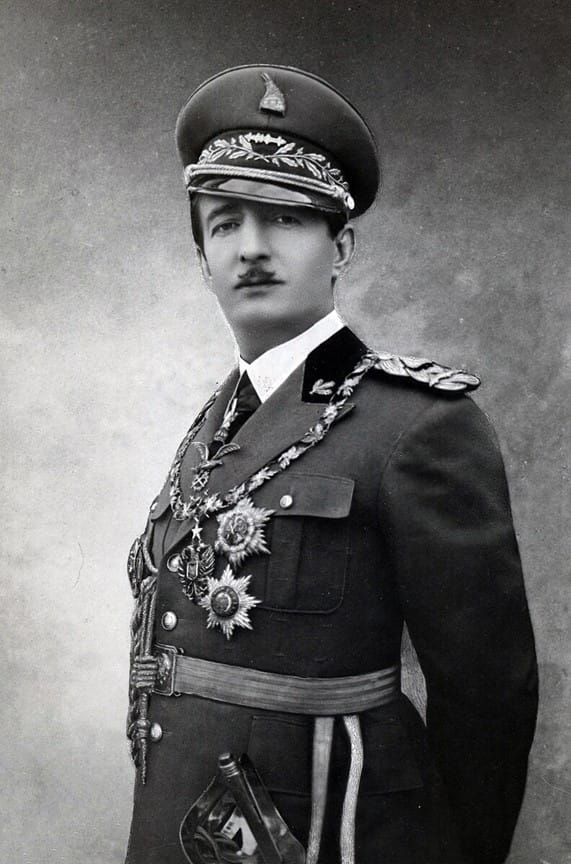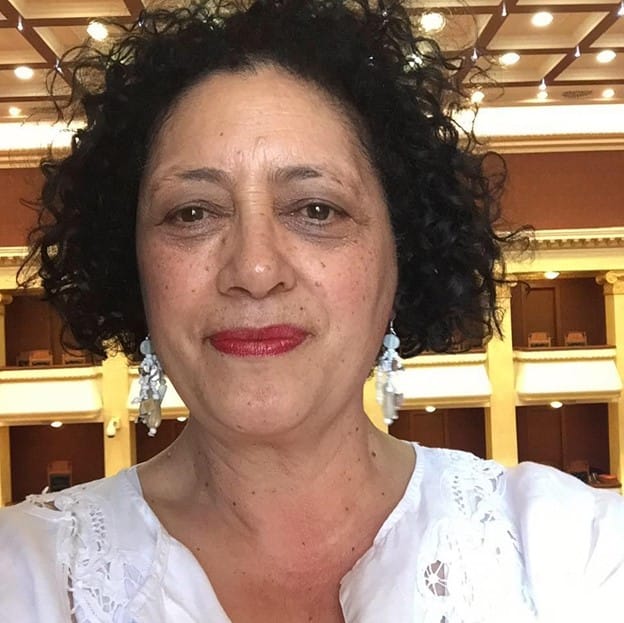From Another Time: The Māori Voice of Albania

It was in the late summer of 1974. I had recently come to live in northern Italy, had not yet begun my final year of high school, and could not yet speak Italian. There were no English language television or radio programmes. I was sixteen years old, unhappy about my new situation and felt such a longing for media in a language that I understood.
Late in the evening I would sometimes listen to the radio, attempting to find popular music and maybe something I could understand. One evening, while exploring the outer edges of the AM band, or perhaps on a short-wave section (we had an old-fashioned radio), I heard a compelling horn solo — a true clarion call — followed by English being spoken.
The broadcast was unlike anything I had ever heard before. It was the news, but the speech was unusual. The announcers were clearly native speakers of English. One was obviously an American from the Deep South, and others were accents I could not precisely place. Maybe British… no, more likely Australians or New Zealanders.
I had stumbled upon Radio Tirana.
Off to consult the Britannica Atlas in our home, I learned that Tirana was the capitol of Albania, a small nation across the Adriatic Sea, east of Italy. The encyclopedia informed me that Albania was a Communist nation, variously aligned and not aligned with Russia and China.
The announcers used a curiously stilted English vocabulary containing terms that may have been in vogue during the Russian Revolution, or perhaps later during Stalinism and flirting with Marxist-Leninism. The news was peppered with expressions such as “enemies of the people”, “petty bourgeoisie”, “lickspittle lackeys of Imperialism”, “comrades and brothers” and so on. Odd.
Radio Tirana broadcast its signal on shortwave and the crackling sound of it was reminiscent of old newsreels from the Second World War. It seemed as though I had been somehow transported into the past.
What I later came to know is that Albania at that time was probably the most secretive and closed country in the world. It was Socialist, or Communist, or Stalinist or some complex combination of both; the brainchild of Enver Hoxha, the ruler of Albania from 1944 until his death in 1985.
The country was a strange combination of self-sufficiency, progressive ideas, free and advanced education, free healthcare, some of the most advanced women’s rights anywhere in the world, yet combined with brutal repression enforced with the zeal of the Stasi.
But back to the radio station. Radio Tirana was founded in 1938 under the reign of King Zog (what a marvelously bizarre and improbable name it seemed to me!). The first words spoken over the air were “Mirëdita, kjo është Radio Tirana”, which mean “Good Day, this is Radio Tirana”.
Thus, an improbable station became a global Communist bastion by the 1970s. It reached Brazilian guerillas, Maoist factions in Asia, Africa and Latin America, and all of Europe. It broadcast in English, Arabic, French, Italian, Greek, Portuguese, German, Indonesian and, in addition to musical selections (a lot of classics, Albanian folk music, and military marches), it kept up a steady steam of anti-capitalist and anti-Soviet messages each and every day.
An interesting side note is that the station broadcast to Europe on 1214 kHz, which interfered with frequency of the British BBC One. This was perhaps the reason I never did find the BBC on our home radio, but could listen with ease to Radio Tirana.
Returning to the mysterious American and Aussie/Kiwi announcers: Who were they? They never stated their names. What would have possessed them to go to the most isolated and mysterious country in the world? How did they even get there?
I listened and wondered. Much later I found that there were theories about whom these people were — an unknown woman from Oregon, an Armenian-American woman, a Māori woman from New Zealand… and no theories on the men.
Many years later I learned the identities of only two of the English speakers, a father and a daughter. Although the father’s story is fascinating, what intrigued me more was the daughter’s story, unique in all the world.

June Taylor was born in Rotorua in the North Island of New Zealand on June 17, 1951. She was a Māori and was adopted by a New Zealand dentist, Ronald Taylor. Ron and his wife were unable to have children of their own and were strongly inclined to adopt Māori children; June was their first (the couple later adopted a younger boy). As an infant, June moved to the West Coast of the South Island of New Zealand to a town called Greymouth, where her adoptive father was a dental surgeon.
Born in 1920, Ron was a committed Socialist and Communist who believed, and certainly desired, that it was only a matter of time before many nations would adopt this philosophy. In preparation for this outcome, Ron taught himself all sorts of trades — carpentry, plumbing and so on. His reasoning was that if New Zealand were to become a Socialist country, he could teach the people how to be self-sufficient and build their own homes and not just help with dental hygiene.
The dental practice in Greymouth (specifically in an area called Taylorville) was a going concern from 1951 through 1966. He was a very active member of the New Zealand Communist Party from about 1954, and travelled extensively throughout his nation, Australia and other countries on behalf of the Party. In fact, his first trip to Albania was in 1963.
Shortly after Ron and his wife Mavis adopted the younger Māori boy, the marriage fell apart. Mavis had run off with Ron’s best friend. Sometime later, Ron married a Māori woman named Violet Wai, born 1931, of the Hangarau Tribe. He and Violet had (I believe) two children together. Sadly, Violet died from lung cancer in 1966, and this (possibly compounded by other events) caused Ron to become ill himself, having what was then termed a “mental breakdown” that saw him hospitalized for an extended period of time.
Shortly after his release from hospital, Ron learned that the Albanian government was seeking a native English speaker who could add polish to existing English translations of the writings of Enver Hoxha, the brilliant, charismatic, and paranoid leader of the Albanian government. Ron decided to go there for a two-year assignment, both as an editor and dental practitioner.
In this manner, Ron and the four Taylor children (sixteen-year-old June, thirteen-year-old Ronnie, an unnamed sibling, and the youngest daughter Hinamoa) left New Zealand to live in Albania.
In 2022, June recounted her experiences to a British short-wave radio enthusiast who, like me, heard the mysterious voice on Radio Tirana in his teens. He doggedly tracked down and met with her while she was visiting her daughter, who living in the west of England at the time.
June began by relating how they arrived in Albania in the winter of 1966 and were met at the airport by Party officials, all of whom were rather scary — big grim men dressed in large heavy Russian-style overcoats and hats who were assigned to meet “special guests of the Party”. Once off the tarmac, the family was put into older Russian cars that sped off toward Tirana.
June stated how she felt she had “stepped out of a time machine”. Other than the vehicles of the party officials, there were no cars anywhere on the potholed roads. There were tidy farms along the way, and wagons being drawn by oxen and mules. She was struck by the quiet of it all. Even in the city of Tirana, other than buses, all was silent, and few people were out and about. When June remarked on the lack of cars, her father explained that no private vehicles were owned in Albania. If you needed to travel you would put in a request and, if granted, you would be given a car with a driver to take you to your destination.
Once they arrived at Tirana, they were taken to their new abode, a rather lovely villa that had been built years prior by the Italians. It had three floors, large rooms, each with a balcony or porch, and all furnished with quality furniture, and delightful rugs and carpets.
June did not immediately go to school. A tutor was assigned to teach Albanian to her and her brother, and shortly after their arrival this woman was tasked to take June into the city to acquaint her with daily living.
Clearly a foreigner in a land where no foreigners were ever seen, June stuck out and was stared at by all. The first order of business was to acquire clothing that would help her blend in. The tutor took her to a big central store to seek out fabric to have dresses made. June was amazed at the lack of items on the shelves. There was no ready-made clothing, but they did find a few rolls of dowdy, coarse, and dark fabric. June spotted a length of better, fancier, red cloth, and despite the misgivings of the tutor, that “luxury” item was purchased, and they went to dressmaker, and later to a cobbler to have shoes made.
After she had reached some level of proficiency in Albanian, the Party decided she would be sent to the University of Tirana and study French in the Foreign Language Department. The decision seemed rather arbitrary to her at the time, but she did enjoy going to school.
She began to make several friends, in particular the students of English who were anxious to practice their skills with a native speaker and who were also interested in learning about the outside world. Initially she had many friends, but at a certain point they stopped spending time with her. She learned much later that the Party had assigned some additional “friends” to her, solely so they could report back conversations and what others had been saying to her. It appears that there were negative consequences for some of them, which is why they stopped associating with her.
After a little while she began to work part-time at Radio Tirana, where her father was employed as an editor. She quite enjoyed the work and was surprised to learn that she was being trained to become an English language announcer. She was likely even more surprised when she ultimately became the “Voice of Radio Tirana”, at least for the English-speaking world.
What she read for the news was provided to her by the Central Committee, and she later stated that she doubted much real research was done on these pieces. Her job was the read them with a good English pronunciation and use the proper intonation.
When I heard her, and others, speak in English on this bizarre short-wave station, I immediately conjured George Orwell’s “1984” in my mind.
Still, June had some sense of purpose, or so it would seem from listening to her 2022 interview.
Then, on April 11, 1985, her world spun around once more. Hoxha had died, and she was the official English announcer of the news. The radio station was in turmoil, and everyone was filled with anxiety, fear and, also, hope. There was a general outpouring of grief, but some felt relieved. Political prisoners might be released. Albania might change and join the outside world.
Here is the broadcast by June Taylor on the death of Hoxha - rather lengthy but with typical verbal style, wording and background effects
June and her family were warned that, as very visible collaborators with the Party and the Hoxha regime, things might become dangerous for them. Her father was the first to leave, returning to New Zealand with his Albanian wife. Her brother and sister followed shortly after, also going back to New Zealand.
June was the last of her family to go. In the early 1990s she, too, went for a time to New Zealand, but returned to Albania in 1997. Some report she married an Albanian surnamed Prifti. She did have children, one of whom we know was in England in 2022.
She seemed quite wistful or saddened when thinking back on the whole experience: She asserted not to have “thrown [her] life away”, that she had a wonderful husband, that she had been through “so much” and had such a “unique roller-coaster” of a life.
When musing over her self-posed question “What did we do this for?” she said that she had seen a country growing up, a society maybe not wholly brainwashed, but certainly saw it healing itself. She asserted that an older generation had fought for their country, a poor society had benefitted from good free education, free health care and that the ideals people’s parents had struggled for would be preserved. But, she added, the leadership thought everything “should be shut off from the outside”, and that “you cannot rely on the conscience of people. Professionals cannot be made to do what you want them to; you cannot stifle them”.
Her final answer to the question “would you do it all over again?” was a quiet, wistful, and definitive “yes”.
Like the determined shortwave radio enthusiast, I have never forgotten that incongruously accented voice in the dark Italian night, a young woman reading news with Stalin-inspired slogans.
Would you like to read other posts? If so, please click the Home Page link below:

You, Dear Reader, are much needed and appreciated.
Everything written requires a reader to make it whole. The writer begins, then you, dear reader, take in the idea and its image, and so become the continuation of its breath. Please subscribe so that my words can breathe. Consider this my hand, reaching out to yours.
